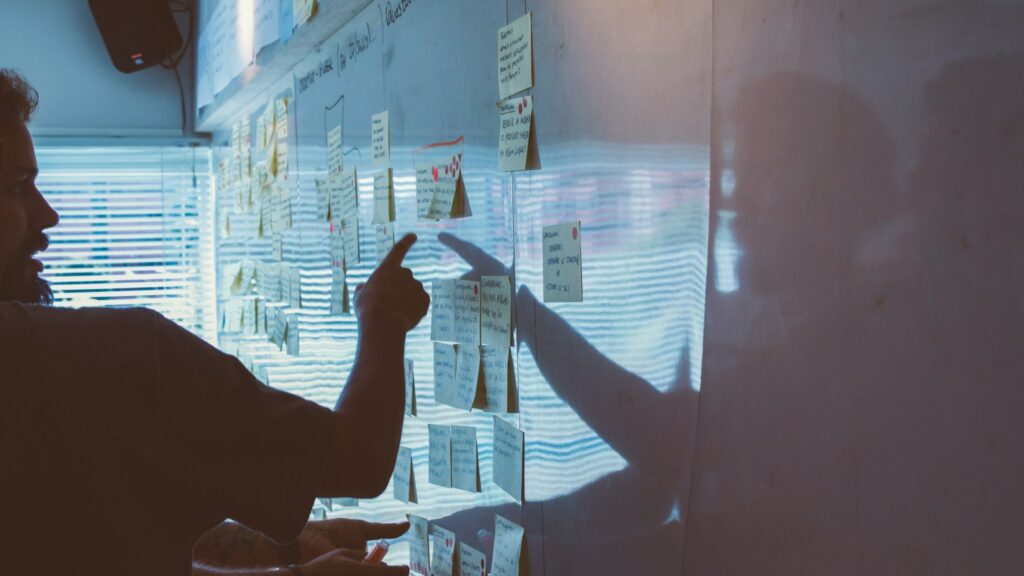I spent two weeks travelling to Antartica with a group of a hundred-odd young leaders to share in their experiences and help them turn what they saw and did in to great learning and personal leadership insights.
I was so bowled over by the experience that I wrote a chapter of my book, Developing Leadership Programmes That Work (Kogan Page 2017), on the experience and what it taught me about leadership.
When we returned to more solid ground, a group of us wondered whether we could create some of that visceral and intense learning in a more accessible place. That is how Peak Leadership 2041 was born.
The thinking behind it can be summed up by my 4 Ds. They are all equally important and challenging and, I would argue, create the conditions for intense learning.
The first D is DISLOCATION
There is something innately challenging about getting away from the familiar. We all know the feeling of somewhere new – somehow, your senses are much more alert, you take more in, and you are slightly wary. Often, you will be more dependent on others and be more open.
We all know the feeling of somewhere new – somehow, your senses are much more alert, you take more in.
It is easier to form strong relationships because you are less self-sufficient; in a strange way, you feel more alive, more tuned in and more receptive. All of the senses work overtime, and this can really help the learning process and make you more open to new ideas and new challenges.
The second D is DISCONNECTION
This is not popular! It is also something I really struggled with for the first few days – and that something is being switched off.
You need a place where phones do not work, and no wifi exists. Being disconnected from the normal ‘always on’ life and not being able to receive, calls or texts or emails etc is very scary at first.
You worry that no-one can get you in an emergency (they can) and that you will miss some critical decision (unlikely) and you wonder how the world is managing with you, somehow, absent from the flow, and unable to connect into it. Very soon though, you adjust. Then you can focus on the present, the here and now, and your companions.
This, in turn, allows reflection and a new perspective. You begin to see what is really important as you discard masses of trivia from your brain. It is like decluttering. Everything suddenly becomes much clearer. This is when you get insights you never would have had elsewhere.
The third D is DISCOMFORT
We have spent most of our careers taking the discomfort out of learning. We make things familiar, relatively unchallenging and extremely comfortable; I would argue that this can be a big mistake.
Not always, but occasionally, getting out of your comfort zone opens you up to new ideas and new experiences. You can learn intensely when you are discomfited – you cannot stop yourself, as our whole being strives to regain equilibrium.
This is a time when you have to rely on other people, and you are doing things and accepting challenges that stretch you, and demand your full attention. Discomfort is brilliant for learning as long as there is a very strong and secure safety net around you, made up of people who will not let you enter into harm’s way, either physically or spiritually. This is the experience that every stretch assignment or new team or different location creates.
Getting out of your comfort zone opens you up to new ideas and new experiences.
When that no longer happens in your career, you become very comfortable. This is the point when the full benefits of a different kind of learning experience, really come to the fore.
The final D is DISCOVERY
This is a product of the other three Ds; if you are dislocated, disconnected and discomfited, you are ripe and ready to learn intensively. You discover new ideas, now perspectives and see things clearer.
This does not happen by accident – unique processes and structures need to be in place that take those experiences and consolidate them into powerful learning. This can change you forever.
The discovery element is a critical by-product of the total experience, but in some ways, the full impact only occurs when you return to your comfortable and familiar location and switch on your phone, and your Wi-Fi network! All of this works only when you return and take action. You have to do things differently, start new plans or processes, and make that learning work for you on a personal and organisational level.
In some ways, the full impact only occurs when you return to your comfortable and familiar location
You can take these insights and build a new kind of learning, or you can take small elements of a role, and change them to incorporate the 4Ds experience.
We, as learning leaders, should argue strongly that allowing people to wallow in trivia, be too comfortable in their role, and never get challenged, is bad for their growth and development – but also bad for the organisation which lets this happen. Innovation never came from comfort with the status quo, for example, and responding to challenges with the same old solutions, always recreates the same old problems!
In this volatile and uncertain environment, we need people who can respond in different ways to the new challenges they face. Having gone through the loop of discomfort and discovery they will be better prepared to do this again and again.
Interested in this topic? Read Embodied leadership: how to be comfortable with being uncomfortable.
I spent two weeks travelling to Antartica with a group of a hundred-odd young leaders to share in their experiences and help them turn what they saw and did in to great learning and personal leadership insights.
I was so bowled over by the experience that I wrote a chapter of my book, Developing Leadership Programmes That Work (Kogan Page 2017), on the experience and what it taught me about leadership.
When we returned to more solid ground, a group of us wondered whether we could create some of that visceral and intense learning in a more accessible place. That is how Peak Leadership 2041 was born.
The thinking behind it can be summed up by my 4 Ds. They are all equally important and challenging and, I would argue, create the conditions for intense learning.
The first D is DISLOCATION
There is something innately challenging about getting away from the familiar. We all know the feeling of somewhere new - somehow, your senses are much more alert, you take more in, and you are slightly wary. Often, you will be more dependent on others and be more open.
We all know the feeling of somewhere new - somehow, your senses are much more alert, you take more in.
It is easier to form strong relationships because you are less self-sufficient; in a strange way, you feel more alive, more tuned in and more receptive. All of the senses work overtime, and this can really help the learning process and make you more open to new ideas and new challenges.
The second D is DISCONNECTION
This is not popular! It is also something I really struggled with for the first few days - and that something is being switched off.
You need a place where phones do not work, and no wifi exists. Being disconnected from the normal ‘always on’ life and not being able to receive, calls or texts or emails etc is very scary at first.
You worry that no-one can get you in an emergency (they can) and that you will miss some critical decision (unlikely) and you wonder how the world is managing with you, somehow, absent from the flow, and unable to connect into it. Very soon though, you adjust. Then you can focus on the present, the here and now, and your companions.
This, in turn, allows reflection and a new perspective. You begin to see what is really important as you discard masses of trivia from your brain. It is like decluttering. Everything suddenly becomes much clearer. This is when you get insights you never would have had elsewhere.
The third D is DISCOMFORT
We have spent most of our careers taking the discomfort out of learning. We make things familiar, relatively unchallenging and extremely comfortable; I would argue that this can be a big mistake.
Not always, but occasionally, getting out of your comfort zone opens you up to new ideas and new experiences. You can learn intensely when you are discomfited - you cannot stop yourself, as our whole being strives to regain equilibrium.
This is a time when you have to rely on other people, and you are doing things and accepting challenges that stretch you, and demand your full attention. Discomfort is brilliant for learning as long as there is a very strong and secure safety net around you, made up of people who will not let you enter into harm’s way, either physically or spiritually. This is the experience that every stretch assignment or new team or different location creates.
Getting out of your comfort zone opens you up to new ideas and new experiences.
When that no longer happens in your career, you become very comfortable. This is the point when the full benefits of a different kind of learning experience, really come to the fore.
The final D is DISCOVERY
This is a product of the other three Ds; if you are dislocated, disconnected and discomfited, you are ripe and ready to learn intensively. You discover new ideas, now perspectives and see things clearer.
This does not happen by accident - unique processes and structures need to be in place that take those experiences and consolidate them into powerful learning. This can change you forever.
The discovery element is a critical by-product of the total experience, but in some ways, the full impact only occurs when you return to your comfortable and familiar location and switch on your phone, and your Wi-Fi network! All of this works only when you return and take action. You have to do things differently, start new plans or processes, and make that learning work for you on a personal and organisational level.
In some ways, the full impact only occurs when you return to your comfortable and familiar location
You can take these insights and build a new kind of learning, or you can take small elements of a role, and change them to incorporate the 4Ds experience.
We, as learning leaders, should argue strongly that allowing people to wallow in trivia, be too comfortable in their role, and never get challenged, is bad for their growth and development - but also bad for the organisation which lets this happen. Innovation never came from comfort with the status quo, for example, and responding to challenges with the same old solutions, always recreates the same old problems!
In this volatile and uncertain environment, we need people who can respond in different ways to the new challenges they face. Having gone through the loop of discomfort and discovery they will be better prepared to do this again and again.
Interested in this topic? Read Embodied leadership: how to be comfortable with being uncomfortable.





